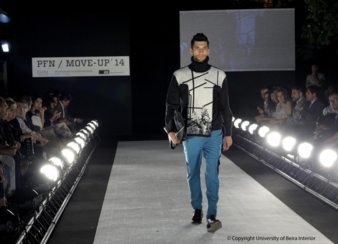10/09/2015 — auf Deutsch lesen
Lectra´s School Spotlight : Beira Interior (UBI)
The University of Beira Interior (UBI) has been training students in science and textile technology since 1975. The school is located in the town of Covilhã, Portugal (nicknamed the “Portuguese Manchester” for its long textile industry tradition) was originally founded as a polytechnic institute, offering courses in textile engineering to support local industry.
It became a full-fledged university in 1986 and has since expanded its curriculum to include degrees in both Textile & Apparel Design, as well as Fashion Design. UBI’s mission is to train highly-qualified individuals through a mix of study, training and research.
A 20 year partnership
The partnership between UBI and Lectra began over 20 years ago, when UBI’s Science and Textile Technology department introduced its Textile & Apparel Design degree. Today, students enrolled in the department’s various programs train on Lectra’s design, pattern making and production-planning solutions, and its Fashion Design Master’s students build their final-year project using Modaris, Lectra’s 3D virtual prototyping solution. With Lectra solutions, UBI students develop practical skills that give them a competitive advantage upon entering the workforce.
For Madalena Pereira, VP of the Science and Textile Technologies Department and Director of the Fashion Design undergraduate and master’s programs at UBI, there is a single driving force behind UBI’s curriculum: industry. “Our policy is to be connected with industry. Without it, the training loses its meaning,” she declares.
UBI’s long-standing partnership with Lectra reflects this policy. Pereira explains, “The Portuguese industry works mainly with Lectra, so our choice was Lectra as well. We need to train people for the industry, so we train them on the solutions that the industry uses.” UBI’s practical approach to learning has served the school well. According to Pereira, most local companies count at least one UBI graduate among their staff and statistics have shown that students increasingly prefer UBI to other schools.
Real-world tools for real-world jobs
Students in UBI’s Fashion Lab CAD undergraduate and Fashion CAD 3D master’s programs use Lectra solutions to develop their collections and practice preparing cutting plans, treating their designs as if they were destined for a real manufacturing environment. Rui Miguel, President of UBI’s Science and Textile Technologies Department explains that this is a strategic decision as it develops practical, hands-on skills. “Our partnership with Lectra is totally vital for us,” Miguel says. “It gives us the fundamental tools to train our students.” Learning how to create and develop with technology is important, he adds, as it can open doors for students once they graduate.
Carving out an industry presence
One of the strengths of UBI’s program is its strong focus on industry partnerships and connecting students with real-world employers like Lectra customer and apparel manufacturer Twintex, which has several UBI students in its internship training program. “Working with Lectra allows us to be better informed about the industry because Lectra works with the industry directly. Our partnership has allowed us to have an industry presence as well,” Pereira comments.
3D: one foot firmly in the future
“During a visit to Modtissimo [a Portuguese fabrics and accessories trade show], I saw a demo and when I came back, I said, ‘We must have 3D! As a university, we need to stay ahead of the market. 3D is the future, so UBI must have 3D,’” recalls Pereira.
Since that first encounter, 3D technology has become an essential component of UBI’s curriculum and students in the school’s Fashion Design master’s program are required to use Lectra’s Modaris 3D to create their final collection. The solution gives students room to be creative while working at the speed and efficiency that the market demands, notes Associate Professor José Lucas, who teaches UBI students how to use the technology.
“It is important for students to understand in advance how something is going to look because sometimes they have an idea in mind, but it doesn’t always translate. With Lectra 3D technology, they create, see their designs virtually and change what they want ahead of time, saving time and fabric. This contributes to sustainability and represents added value for companies,” Pereira explains. She adds, “3D changes the way that students work.”
Student Corner
“A big added value with UBI is that it gives students the opportunity to learn and work with Lectra solutions. It’s a big step towards getting a job!” enthuses Liliana Pina, a graduate of UBI’s Apparel Design master’s program. Liliana has been working as an assistant pattern maker at clothing manufacturer Twintex since December 2013, thanks to her comprehensive training at the Portuguese university. “While completing my master’s degree, I used Modaris to create some of the patterns in my collection. When I showed my portfolio to Twintex during my interview, this was seen as a plus.”




